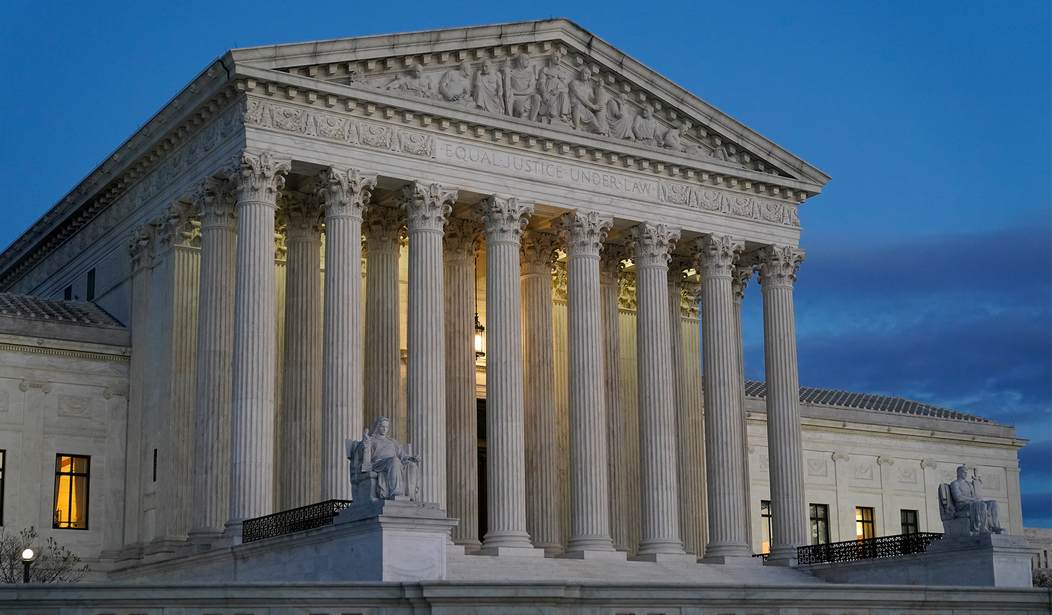I'm happy to announce that this installment of the Skinny on SCOTUS will get us caught up (for now) on the 2024 term. Keep in mind, though, that we're only about halfway through with the decisions they're expected to hand down before the end of the term. May and June will be busy.
Most of the decisions in this grouping are, again, on the technical/procedural side. We've got one unanimous decision, a 7-2 split (with Kagan siding with the majority), and two 5-4 decisions. Note that those last two involve Roberts and Gorsuch siding with the court's liberals in one, and the last one has a really interesting twist (in terms of alignment): Thomas, Alito, Kagan, and Jackson in the dissent.
All of which is to remind folks that, as partisan as our world is and as easy as it is to try to view every court ruling via a partisan or ideological lens, more often than not, that's not how they shake out.
With that said, here they are:
Late April 2025 Decisions
Cunningham v. Cornell University
Date: April 17, 2025
Author: Sotomayor
Split: 9-0
Dissent: N/A
Appeal From: 2nd Circuit
The Employee Retirement Income Security Act of 1974 (ERISA) prohibits plan fiduciaries from causing a plan to engage in certain transactions with parties in interest. 29 U. S. C. §1106. A separate provision, §1108(b)(2)(A), exempts from these prohibitions any transaction that involves “[c]ontracting or making reasonable arrangements with a party in interest for office space, or legal, accounting, or other services necessary for the establishment or operation of the plan, if no more than reasonable compensation is paid therefor.” The question presented is whether, to state a claim under §1106, a plaintiff must plead that §1108(b)(2)(A) does not apply to an alleged prohibited transaction.
Petitioners represent a class of current and former Cornell University employees who participated in two defined-contribution retirement plans from 2010 to 2016. In 2017, they sued Cornell and other plan fiduciaries for allegedly causing the plans to engage in prohibited transactions for recordkeeping services with the Teachers Insurance and Annuity Association of America-College Retirement Equities Fund and Fidelity Investments Inc., in violation of §1106(a)(1)(C). Petitioners claimed the plans paid these service providers substantially more than reasonable recordkeeping fees. The District Court dismissed the prohibited-transaction claim, and the Second Circuit affirmed. The Second Circuit held that §1108(b)(2)(A) is incorporated into §1106(a)’s prohibitions, requiring plaintiffs to plead that a transaction was “unnecessary or involved unreasonable compensation” to survive a motion to dismiss.
Whether a plaintiff can state a claim by alleging that a plan fiduciary engaged in a transaction constituting a furnishing of goods, services, or facilities between the plan and a party in interest, as proscribed by 29 U.S.C. § 1106(a)(1)(C), or whether a plaintiff must plead and prove additional elements and facts not contained in the provision's text.
Holding: Reversed and remanded.
To state a claim under §1106(a)(1)(C), a plaintiff need only plausibly allege the elements contained in that provision itself, without addressing potential §1108 exemptions.
Skinny: Dotting the "i's" will suffice. I frequently characterize decisions as "procedural" — this one is as procedural as they come. Basically, it turns on how much info a plaintiff needs to include in their Complaint to get past a motion to dismiss. (Here, the Supreme Court held that they don't have to include every little thing, including possible exceptions, and the lower courts got it wrong.) That's it. That's all it's about.
Date: April 22, 2025
Author: Gorsuch
Split: 5-4
Dissent: Thomas, Alito, Kavanaugh, Barrett
Appeal From: 10th Circuit
The federal government initiated removal proceedings against petitioner Monsalvo Velázquez, who asked the government to suspend its removal efforts or, alternatively, to permit him to leave the United States voluntarily. The immigration judge concluded Monsalvo was removable but granted him an opportunity to voluntarily depart within 60 days. After the Board of Immigration Appeals rejected his appeal, it granted Monsalvo a new 60-day voluntary departure period. The 60th day fell on Saturday, December 11, 2021. Monsalvo filed a motion to reopen proceedings on Monday, December 13. The Board rejected that motion, concluding that the voluntary departure period had expired on Saturday, and Monsalvo’s motion was therefore too late. Monsalvo asked the Board to reconsider that conclusion, but the Board refused. Monsalvo then petitioned for judicial review in the Tenth Circuit. The Tenth Circuit agreed with the Board, holding that the voluntary departure deadline in 8 U. S. C. §1229c(b)(2) refers to calendar days with no extension for deadlines that fall on weekends or holidays.
When a noncitizen's voluntary-departure period ends on a weekend or public holiday, is a motion to reopen filed the next business day sufficient to avoid the penalties for failure to depart?
Holding: Reversed.
Under §1229c(b)(2), a voluntary-departure deadline that falls on a weekend or legal holiday extends to the next business day.
Skinny: Under this statute, deadlines that fall on weekends or holidays extend to the next business day.
Added Note: I saw a lot of folks up in arms about this decision when it was handed down — possibly because it's in the context of immigration, and that's such a hot-button issue these days. But I think people are reading way too much into it.
- First, this involved removal proceedings from 2021 (not any actions taken under the Trump administration).
- Second, in this instance, the deadline fell on a Saturday. Monsalvo's attorney actually served the government with his motion to reopen the matter on that Friday, and overnighted a copy to the Board of Immigration Appeals that same day, but the Board didn't accept the motion for filing until Monday.
- Third, a similar principle is applied in most legal proceedings — it may seem antiquated now because of electronic filing and our 24/7 world, but any filing/pleading deadlines that fell on weekends or holidays were always treated as extending to the next business day. Heck, we even used to have to add in three days for mailing on top of that!
- Lastly, this ruling simply means that Monsalvo is entitled to have his motion to reopen the matter heard by the Board. It doesn't mean he'll be successful.
Advocate Christ Medical Center v. Kennedy
Date: April 29, 2025
Author: Barrett
Split: 7-2
Dissent: Jackson, Sotomayor
Appeal From: D.C. Circuit
When hospitals provide inpatient services to Medicare beneficiaries, the Medicare program pays those hospitals a fixed rate for treating each Medicare patient. See 42 U. S. C. §§1395ww(d)(1)–(4). Congress also provides various hospital-specific rate adjustments, including the “disproportionate share hospital” (DSH) adjustment, which offers additional funding to hospitals that treat a high percentage of low-income patients. To calculate the DSH adjustment, the Department of Health and Human Services (HHS) adds together two statutorily prescribed fractions referred to as the Medicare fraction and the Medicaid fraction. §1395ww(d)(5)(F)(vi). The Medicare fraction “represents the proportion of a hospital’s Medicare patients who have low incomes,” and the Medicaid fraction “represents the proportion of a hospital’s patients who are not entitled to Medicare and have low incomes.” Becerrav. Empire Health Foundation, for Valley Hospital Medical Center, 597U. S. 424, 429–430. When the Medicare fraction is expressed as a percentage and added to the Medicaid fraction’s percentage, the sum yields the disproportionate patient percentage. §1395ww(d)(5)(F)(vi).That percentage, in turn, determines whether a hospital will receive a DSH adjustment—and if so, how much.
Relevant here, the numerator of the Medicare is defined by the statute as “the number of [a] hospital’s patient days” attributable to patients “who (for such days) were entitled to benefits under [Medicare] part A” and “entitled to supplementary security income [SSI] benefits. . . under subchapter XVI.” §1395ww(d)(5)(F)(vi)(I). This Court in Empire Health has held that the phrase “ ‘entitled to [Medicare Part A] benefits’ ” in the Medicare fraction includes “all those qualifying for the program, regardless of whether they are receiving Medicare payments for part or all of a hospital stay.” 597 U. S., at 445 (quoting§1395ww(d)(5)(F)(vi)(I); alteration in original). But the Court has not addressed the issue presented in this case—i.e., which patients count as being “entitled to [SSI] benefits . . . under subchapter XVI.” HHS interprets the language to mean patients who are entitled to receive an SSI payment during the month in which they were hospitalized. Petitioners—a group of more than 200 hospitals—insist that the phrase includes all patients enrolled in the SSI system at the time of their hospitalization, even if they were not entitled to an SSI payment during their month of hospitalization. The hospitals claim that, as a result of HHS’s misinterpretation of the phrase, HHS miscalculated the hospitals’ DSH adjustment and underfunded the hospitals from 2006 to 2009. The hospitals have lost at every stage of this litigation, including most recently before the D. C. Circuit. The D. C. Circuit concluded that SSI benefits in “subchapter XVI [are] about cash payments for needy individuals,” and that “it makes little sense to say that individuals are ‘entitled’ to the benefit in months when they are not even eligible for [a payment].” Advocate Christ Medical Center v. Becerra,80 F. 4th 346, 352–353. The Court granted certiorari.
(emphasis mine)
Does the phrase "entitled ... to benefits," used twice in the same sentence of the Medicare Act, mean the same thing for Medicare Part A and SSI, such that it includes all who meet basic program eligibility criteria, whether or not benefits are actually received?
Holding: Affirmed.
In calculating the Medicare fraction, an individual is “entitled to[SSI] benefits” for purposes of the Medicare fraction when she is eligible to receive an SSI cash payment during the month of her hospitalization.
Skinny: The hospitals continue to lose. (To count patients as "entitled to SSI benefits," they must be entitled to receive an SSI payment during the month in which they were hospitalized, not just enrolled in the SSI system.)
Feliciano v. Department of Transportation
Date: April 30, 2025
Author: Gorsuch
Split: 5-4
Dissent: Thomas, Alito, Kagan, Jackson
Appeal From: Federal Circuit
Tens of thousands of federal civilian employees serve the Nation as military reservists. When called to active duty, these reservists often receive less pay than they earn in their civilian jobs. To address this gap, Congress adopted a “differential pay” statute requiring the government to make up the difference between a federal civilian employee’s military and civilian pay in various circumstances, including when the reservist is called to active duty “during a national emergency.” At issue here is whether this language guarantees differential pay when a reservist serves on active duty while a national emergency is ongoing, or whether it requires proving a “substantive connection” between the service and a particular national emergency.
Petitioner Nick Feliciano, an air traffic controller with the Federal Aviation Administration, also served as a Coast Guard reserve petty officer. In July 2012, the Coast Guard ordered him to active duty under 10 U. S. C. §12301(d), which authorizes activation of reservists with their consent. He remained on active duty until February 2017, serving aboard a Coast Guard ship escorting vessels to and from harbor. His orders noted that he was called to active duty “in support of "several contingency operation[s],” including Operations Iraqi Freedom and Enduring Freedom. Throughout this period, Feliciano did not receive differential pay for his service pursuant to orders under §12301(d). After the Merit Systems Protection Board rejected his differential-pay claim, he appealed to the Federal Circuit.
Feliciano argued that two statutes entitled him to differential pay: 5 U. S. C. §5538(a) and 10 U. S. C. §101(a)(13)(B). Section 5538(a) requires differential pay for federal civilian employee reservists ordered to active duty “under . . . a provision of law referred to in”§101(a)(13)(B). Section 101(a)(13)(B) defines “contingency operation” to include operations that result in the call to active duty of servicemembers under several enumerated statutes “or any other provision of law during a war or during a national emergency declared by the President or Congress.” While acknowledging he was not called up under any of the specifically listed statutes, Feliciano contended that the final phrase entitled him to differential pay because he was ordered to active duty under “any other provision of law” (§12301(d)) “during a national emergency.”
The Federal Circuit disagreed. Following its earlier decision in Adams v. Department of Homeland Security, 3 F. 4th 1375, the court held that when a reservist seeks differential pay for service “during a national emergency,” he must show not only that he served while a national emergency was ongoing, but also that a substantive connection linked his service to a particular national emergency.
Whether a federal civilian employee called or ordered to active duty under a provision of law during a national emergency is entitled to differential pay even if the duty is not directly connected to the national emergency.
Holding: Reversed.
A federal civilian employee called to active duty pursuant to “any other provision of law . . . during a national emergency” as described in §101(a)(13)(B) is entitled to differential pay if the reservist’s service temporally coincides with a declared national emergency without any showing that the service bears a substantive connection to a particular emergency.
Skinny: Reservists win. (They're entitled to differential pay if called up to active duty during a national emergency, even if their service isn't directly tied to that emergency.)
You can check out prior installments of The Skinny on SCOTUS series here.














